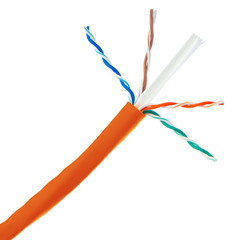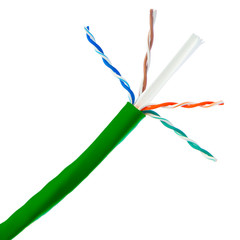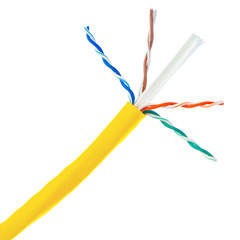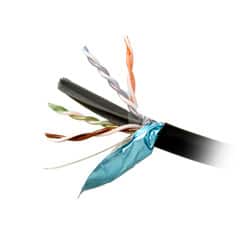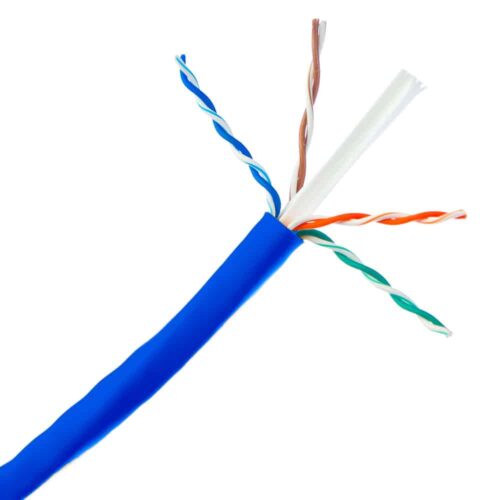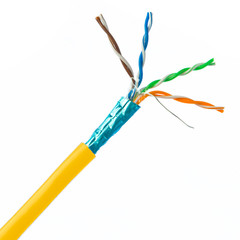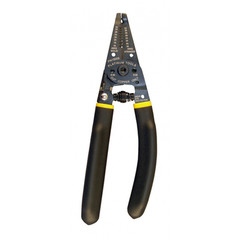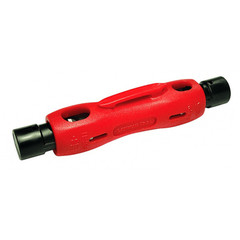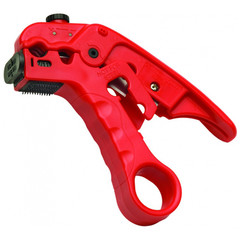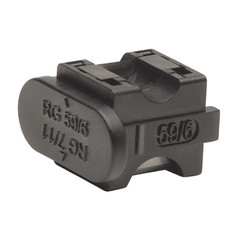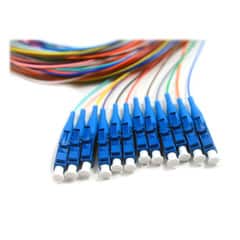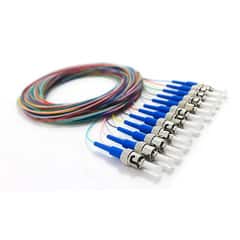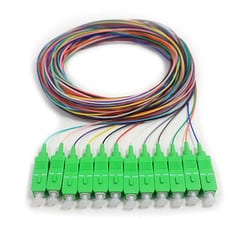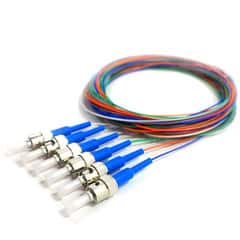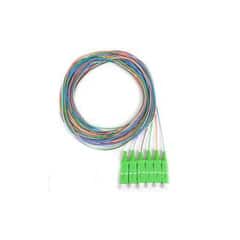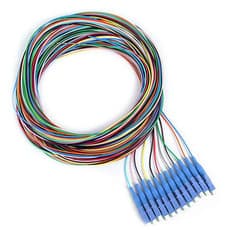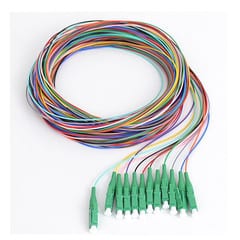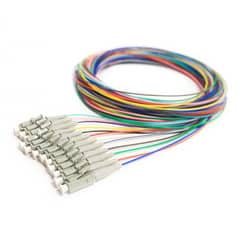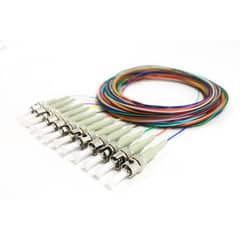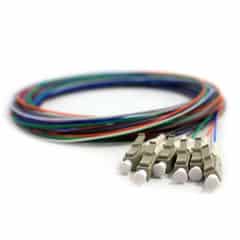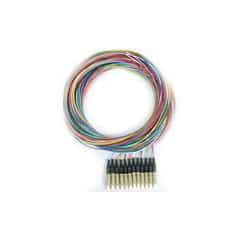-
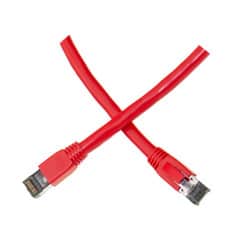 This 10-foot Category 8.1 cable, Class I channel, features a red PVC jacket, braided outer shield, with four individually mylar foil shielded 24 AWG pure copper pairs as defined in ISO/IEC 11801 and ratified in ANSI/TIA 568-C.2-1. Cat8 cabling was designed primarily for high-speed data centers where switches, servers, and other network hardware are located in close proximity. This newest copper communications cable offers greater flexibility both literally and in distances when compared to QSFP+ and Twinax DAC assemblies which typically cost significantly more and are often much more limited in scope. It has the reach to cover Top-of-Rack and End-of-Row or Middle-of-Row network topologies while delivering 10, 25, and 40 Gigabit data rates over BASE-T technology with RJ45 ends making it a drop-in replacement for Cat6a where rates beyond 10Gb will be needed today or in the future. Cat8 has stricter specifications for noise restriction and crosstalk than any of its predecessors. The individual conductors are 24 AWG (American wire gauge) stranded pure copper. Cat8 patch cables are stranded to improve flexibility. Pure copper conductors provide the best signal possible. Each pair of conductors is shielded with an aluminum mylar foil to reduce, if not eliminate, crosstalk. These cables also have a braided shield, which protects from outside electromagnetic interference.Part No. 13X8-57110
This 10-foot Category 8.1 cable, Class I channel, features a red PVC jacket, braided outer shield, with four individually mylar foil shielded 24 AWG pure copper pairs as defined in ISO/IEC 11801 and ratified in ANSI/TIA 568-C.2-1. Cat8 cabling was designed primarily for high-speed data centers where switches, servers, and other network hardware are located in close proximity. This newest copper communications cable offers greater flexibility both literally and in distances when compared to QSFP+ and Twinax DAC assemblies which typically cost significantly more and are often much more limited in scope. It has the reach to cover Top-of-Rack and End-of-Row or Middle-of-Row network topologies while delivering 10, 25, and 40 Gigabit data rates over BASE-T technology with RJ45 ends making it a drop-in replacement for Cat6a where rates beyond 10Gb will be needed today or in the future. Cat8 has stricter specifications for noise restriction and crosstalk than any of its predecessors. The individual conductors are 24 AWG (American wire gauge) stranded pure copper. Cat8 patch cables are stranded to improve flexibility. Pure copper conductors provide the best signal possible. Each pair of conductors is shielded with an aluminum mylar foil to reduce, if not eliminate, crosstalk. These cables also have a braided shield, which protects from outside electromagnetic interference.Part No. 13X8-57110 -
 This 15-foot Category 8.1 cable, Class I channel, features a red PVC jacket, braided outer shield, with four individually mylar foil shielded 24 AWG pure copper pairs as defined in ISO/IEC 11801 and ratified in ANSI/TIA 568-C.2-1. Cat8 cabling was designed primarily for high-speed data centers where switches, servers, and other network hardware are located in close proximity. This newest copper communications cable offers greater flexibility both literally and in distances when compared to QSFP+ and Twinax DAC assemblies which typically cost significantly more and are often much more limited in scope. It has the reach to cover Top-of-Rack and End-of-Row or Middle-of-Row network topologies while delivering 10, 25, and 40 Gigabit data rates over BASE-T technology with RJ45 ends making it a drop-in replacement for Cat6a where rates beyond 10Gb will be needed today or in the future. Cat8 has stricter specifications for noise restriction and crosstalk than any of its predecessors. The individual conductors are 24 AWG (American wire gauge) stranded pure copper. Cat8 patch cables are stranded to improve flexibility. Pure copper conductors provide the best signal possible. Each pair of conductors is shielded with an aluminum mylar foil to reduce, if not eliminate, crosstalk. These cables also have a braided shield, which protects from outside electromagnetic interference.Part No. 13X8-57115
This 15-foot Category 8.1 cable, Class I channel, features a red PVC jacket, braided outer shield, with four individually mylar foil shielded 24 AWG pure copper pairs as defined in ISO/IEC 11801 and ratified in ANSI/TIA 568-C.2-1. Cat8 cabling was designed primarily for high-speed data centers where switches, servers, and other network hardware are located in close proximity. This newest copper communications cable offers greater flexibility both literally and in distances when compared to QSFP+ and Twinax DAC assemblies which typically cost significantly more and are often much more limited in scope. It has the reach to cover Top-of-Rack and End-of-Row or Middle-of-Row network topologies while delivering 10, 25, and 40 Gigabit data rates over BASE-T technology with RJ45 ends making it a drop-in replacement for Cat6a where rates beyond 10Gb will be needed today or in the future. Cat8 has stricter specifications for noise restriction and crosstalk than any of its predecessors. The individual conductors are 24 AWG (American wire gauge) stranded pure copper. Cat8 patch cables are stranded to improve flexibility. Pure copper conductors provide the best signal possible. Each pair of conductors is shielded with an aluminum mylar foil to reduce, if not eliminate, crosstalk. These cables also have a braided shield, which protects from outside electromagnetic interference.Part No. 13X8-57115 -
 This 25-foot Category 8.1 cable, Class I channel, features a red PVC jacket, braided outer shield, with four individually mylar foil shielded 24 AWG pure copper pairs as defined in ISO/IEC 11801 and ratified in ANSI/TIA 568-C.2-1. Cat8 cabling was designed primarily for high-speed data centers where switches, servers, and other network hardware are located in close proximity. This newest copper communications cable offers greater flexibility both literally and in distances when compared to QSFP+ and Twinax DAC assemblies which typically cost significantly more and are often much more limited in scope. It has the reach to cover Top-of-Rack and End-of-Row or Middle-of-Row network topologies while delivering 10, 25, and 40 Gigabit data rates over BASE-T technology with RJ45 ends making it a drop-in replacement for Cat6a where rates beyond 10Gb will be needed today or in the future. Cat8 has stricter specifications for noise restriction and crosstalk than any of its predecessors. The individual conductors are 24 AWG (American wire gauge) stranded pure copper. Cat8 patch cables are stranded to improve flexibility. Pure copper conductors provide the best signal possible. Each pair of conductors is shielded with an aluminum mylar foil to reduce, if not eliminate, crosstalk. These cables also have a braided shield, which protects from outside electromagnetic interference.Part No. 13X8-57125
This 25-foot Category 8.1 cable, Class I channel, features a red PVC jacket, braided outer shield, with four individually mylar foil shielded 24 AWG pure copper pairs as defined in ISO/IEC 11801 and ratified in ANSI/TIA 568-C.2-1. Cat8 cabling was designed primarily for high-speed data centers where switches, servers, and other network hardware are located in close proximity. This newest copper communications cable offers greater flexibility both literally and in distances when compared to QSFP+ and Twinax DAC assemblies which typically cost significantly more and are often much more limited in scope. It has the reach to cover Top-of-Rack and End-of-Row or Middle-of-Row network topologies while delivering 10, 25, and 40 Gigabit data rates over BASE-T technology with RJ45 ends making it a drop-in replacement for Cat6a where rates beyond 10Gb will be needed today or in the future. Cat8 has stricter specifications for noise restriction and crosstalk than any of its predecessors. The individual conductors are 24 AWG (American wire gauge) stranded pure copper. Cat8 patch cables are stranded to improve flexibility. Pure copper conductors provide the best signal possible. Each pair of conductors is shielded with an aluminum mylar foil to reduce, if not eliminate, crosstalk. These cables also have a braided shield, which protects from outside electromagnetic interference.Part No. 13X8-57125 -
 This 35-foot Category 8.1 cable, Class I channel, features a red PVC jacket, braided outer shield, with four individually mylar foil shielded 24 AWG pure copper pairs as defined in ISO/IEC 11801 and ratified in ANSI/TIA 568-C.2-1. Cat8 cabling was designed primarily for high-speed data centers where switches, servers, and other network hardware are located in close proximity. This newest copper communications cable offers greater flexibility both literally and in distances when compared to QSFP+ and Twinax DAC assemblies which typically cost significantly more and are often much more limited in scope. It has the reach to cover Top-of-Rack and End-of-Row or Middle-of-Row network topologies while delivering 10, 25, and 40 Gigabit data rates over BASE-T technology with RJ45 ends making it a drop-in replacement for Cat6a where rates beyond 10Gb will be needed today or in the future. Cat8 has stricter specifications for noise restriction and crosstalk than any of its predecessors. The individual conductors are 24 AWG (American wire gauge) stranded pure copper. Cat8 patch cables are stranded to improve flexibility. Pure copper conductors provide the best signal possible. Each pair of conductors is shielded with an aluminum mylar foil to reduce, if not eliminate, crosstalk. These cables also have a braided shield, which protects from outside electromagnetic interference.Part No. 13X8-57135
This 35-foot Category 8.1 cable, Class I channel, features a red PVC jacket, braided outer shield, with four individually mylar foil shielded 24 AWG pure copper pairs as defined in ISO/IEC 11801 and ratified in ANSI/TIA 568-C.2-1. Cat8 cabling was designed primarily for high-speed data centers where switches, servers, and other network hardware are located in close proximity. This newest copper communications cable offers greater flexibility both literally and in distances when compared to QSFP+ and Twinax DAC assemblies which typically cost significantly more and are often much more limited in scope. It has the reach to cover Top-of-Rack and End-of-Row or Middle-of-Row network topologies while delivering 10, 25, and 40 Gigabit data rates over BASE-T technology with RJ45 ends making it a drop-in replacement for Cat6a where rates beyond 10Gb will be needed today or in the future. Cat8 has stricter specifications for noise restriction and crosstalk than any of its predecessors. The individual conductors are 24 AWG (American wire gauge) stranded pure copper. Cat8 patch cables are stranded to improve flexibility. Pure copper conductors provide the best signal possible. Each pair of conductors is shielded with an aluminum mylar foil to reduce, if not eliminate, crosstalk. These cables also have a braided shield, which protects from outside electromagnetic interference.Part No. 13X8-57135 -
 This 50-foot Category 8.1 cable, Class I channel, features a red PVC jacket, braided outer shield, with four individually mylar foil shielded 24 AWG pure copper pairs as defined in ISO/IEC 11801 and ratified in ANSI/TIA 568-C.2-1. Cat8 cabling was designed primarily for high-speed data centers where switches, servers, and other network hardware are located in close proximity. This newest copper communications cable offers greater flexibility both literally and in distances when compared to QSFP+ and Twinax DAC assemblies which typically cost significantly more and are often much more limited in scope. It has the reach to cover Top-of-Rack and End-of-Row or Middle-of-Row network topologies while delivering 10, 25, and 40 Gigabit data rates over BASE-T technology with RJ45 ends making it a drop-in replacement for Cat6a where rates beyond 10Gb will be needed today or in the future. Cat8 has stricter specifications for noise restriction and crosstalk than any of its predecessors. The individual conductors are 24 AWG (American wire gauge) stranded pure copper. Cat8 patch cables are stranded to improve flexibility. Pure copper conductors provide the best signal possible. Each pair of conductors is shielded with an aluminum mylar foil to reduce, if not eliminate, crosstalk. These cables also have a braided shield, which protects from outside electromagnetic interference.Part No. 13X8-57150
This 50-foot Category 8.1 cable, Class I channel, features a red PVC jacket, braided outer shield, with four individually mylar foil shielded 24 AWG pure copper pairs as defined in ISO/IEC 11801 and ratified in ANSI/TIA 568-C.2-1. Cat8 cabling was designed primarily for high-speed data centers where switches, servers, and other network hardware are located in close proximity. This newest copper communications cable offers greater flexibility both literally and in distances when compared to QSFP+ and Twinax DAC assemblies which typically cost significantly more and are often much more limited in scope. It has the reach to cover Top-of-Rack and End-of-Row or Middle-of-Row network topologies while delivering 10, 25, and 40 Gigabit data rates over BASE-T technology with RJ45 ends making it a drop-in replacement for Cat6a where rates beyond 10Gb will be needed today or in the future. Cat8 has stricter specifications for noise restriction and crosstalk than any of its predecessors. The individual conductors are 24 AWG (American wire gauge) stranded pure copper. Cat8 patch cables are stranded to improve flexibility. Pure copper conductors provide the best signal possible. Each pair of conductors is shielded with an aluminum mylar foil to reduce, if not eliminate, crosstalk. These cables also have a braided shield, which protects from outside electromagnetic interference.Part No. 13X8-57150 -
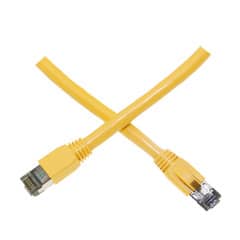 This 6-inch Category 8.1 cable, Class I channel, features a yellow PVC jacket, braided outer shield, with four individually mylar foil shielded 24 AWG pure copper pairs as defined in ISO/IEC 11801 and ratified in ANSI/TIA 568-C.2-1. Cat8 cabling was designed primarily for high-speed data centers where switches, servers, and other network hardware are located in close proximity. This newest copper communications cable offers greater flexibility both literally and in distances when compared to QSFP+ and Twinax DAC assemblies which typically cost significantly more and are often much more limited in scope. It has the reach to cover Top-of-Rack and End-of-Row or Middle-of-Row network topologies while delivering 10, 25, and 40 Gigabit data rates over BASE-T technology with RJ45 ends making it a drop-in replacement for Cat6a where rates beyond 10Gb will be needed today or in the future. Cat8 has stricter specifications for noise restriction and crosstalk than any of its predecessors. The individual conductors are 24 AWG (American wire gauge) stranded pure copper. Cat8 patch cables are stranded to improve flexibility. Pure copper conductors provide the best signal possible. Each pair of conductors is shielded with an aluminum mylar foil to reduce, if not eliminate, crosstalk. These cables also have a braided shield, which protects from outside electromagnetic interference.Part No. 13X8-58100.5
This 6-inch Category 8.1 cable, Class I channel, features a yellow PVC jacket, braided outer shield, with four individually mylar foil shielded 24 AWG pure copper pairs as defined in ISO/IEC 11801 and ratified in ANSI/TIA 568-C.2-1. Cat8 cabling was designed primarily for high-speed data centers where switches, servers, and other network hardware are located in close proximity. This newest copper communications cable offers greater flexibility both literally and in distances when compared to QSFP+ and Twinax DAC assemblies which typically cost significantly more and are often much more limited in scope. It has the reach to cover Top-of-Rack and End-of-Row or Middle-of-Row network topologies while delivering 10, 25, and 40 Gigabit data rates over BASE-T technology with RJ45 ends making it a drop-in replacement for Cat6a where rates beyond 10Gb will be needed today or in the future. Cat8 has stricter specifications for noise restriction and crosstalk than any of its predecessors. The individual conductors are 24 AWG (American wire gauge) stranded pure copper. Cat8 patch cables are stranded to improve flexibility. Pure copper conductors provide the best signal possible. Each pair of conductors is shielded with an aluminum mylar foil to reduce, if not eliminate, crosstalk. These cables also have a braided shield, which protects from outside electromagnetic interference.Part No. 13X8-58100.5 -
 This 1-foot Category 8.1 cable, Class I channel, features a yellow PVC jacket, braided outer shield, with four individually mylar foil shielded 24 AWG pure copper pairs as defined in ISO/IEC 11801 and ratified in ANSI/TIA 568-C.2-1. Cat8 cabling was designed primarily for high-speed data centers where switches, servers, and other network hardware are located in close proximity. This newest copper communications cable offers greater flexibility both literally and in distances when compared to QSFP+ and Twinax DAC assemblies which typically cost significantly more and are often much more limited in scope. It has the reach to cover Top-of-Rack and End-of-Row or Middle-of-Row network topologies while delivering 10, 25, and 40 Gigabit data rates over BASE-T technology with RJ45 ends making it a drop-in replacement for Cat6a where rates beyond 10Gb will be needed today or in the future. Cat8 has stricter specifications for noise restriction and crosstalk than any of its predecessors. The individual conductors are 24 AWG (American wire gauge) stranded pure copper. Cat8 patch cables are stranded to improve flexibility. Pure copper conductors provide the best signal possible. Each pair of conductors is shielded with an aluminum mylar foil to reduce, if not eliminate, crosstalk. These cables also have a braided shield, which protects from outside electromagnetic interference.Part No. 13X8-58101
This 1-foot Category 8.1 cable, Class I channel, features a yellow PVC jacket, braided outer shield, with four individually mylar foil shielded 24 AWG pure copper pairs as defined in ISO/IEC 11801 and ratified in ANSI/TIA 568-C.2-1. Cat8 cabling was designed primarily for high-speed data centers where switches, servers, and other network hardware are located in close proximity. This newest copper communications cable offers greater flexibility both literally and in distances when compared to QSFP+ and Twinax DAC assemblies which typically cost significantly more and are often much more limited in scope. It has the reach to cover Top-of-Rack and End-of-Row or Middle-of-Row network topologies while delivering 10, 25, and 40 Gigabit data rates over BASE-T technology with RJ45 ends making it a drop-in replacement for Cat6a where rates beyond 10Gb will be needed today or in the future. Cat8 has stricter specifications for noise restriction and crosstalk than any of its predecessors. The individual conductors are 24 AWG (American wire gauge) stranded pure copper. Cat8 patch cables are stranded to improve flexibility. Pure copper conductors provide the best signal possible. Each pair of conductors is shielded with an aluminum mylar foil to reduce, if not eliminate, crosstalk. These cables also have a braided shield, which protects from outside electromagnetic interference.Part No. 13X8-58101 -
 This 3-foot Category 8.1 cable, Class I channel, features a yellow PVC jacket, braided outer shield, with four individually mylar foil shielded 24 AWG pure copper pairs as defined in ISO/IEC 11801 and ratified in ANSI/TIA 568-C.2-1. Cat8 cabling was designed primarily for high-speed data centers where switches, servers, and other network hardware are located in close proximity. This newest copper communications cable offers greater flexibility both literally and in distances when compared to QSFP+ and Twinax DAC assemblies which typically cost significantly more and are often much more limited in scope. It has the reach to cover Top-of-Rack and End-of-Row or Middle-of-Row network topologies while delivering 10, 25, and 40 Gigabit data rates over BASE-T technology with RJ45 ends making it a drop-in replacement for Cat6a where rates beyond 10Gb will be needed today or in the future. Cat8 has stricter specifications for noise restriction and crosstalk than any of its predecessors. The individual conductors are 24 AWG (American wire gauge) stranded pure copper. Cat8 patch cables are stranded to improve flexibility. Pure copper conductors provide the best signal possible. Each pair of conductors is shielded with an aluminum mylar foil to reduce, if not eliminate, crosstalk. These cables also have a braided shield, which protects from outside electromagnetic interference.Part No. 13X8-58103
This 3-foot Category 8.1 cable, Class I channel, features a yellow PVC jacket, braided outer shield, with four individually mylar foil shielded 24 AWG pure copper pairs as defined in ISO/IEC 11801 and ratified in ANSI/TIA 568-C.2-1. Cat8 cabling was designed primarily for high-speed data centers where switches, servers, and other network hardware are located in close proximity. This newest copper communications cable offers greater flexibility both literally and in distances when compared to QSFP+ and Twinax DAC assemblies which typically cost significantly more and are often much more limited in scope. It has the reach to cover Top-of-Rack and End-of-Row or Middle-of-Row network topologies while delivering 10, 25, and 40 Gigabit data rates over BASE-T technology with RJ45 ends making it a drop-in replacement for Cat6a where rates beyond 10Gb will be needed today or in the future. Cat8 has stricter specifications for noise restriction and crosstalk than any of its predecessors. The individual conductors are 24 AWG (American wire gauge) stranded pure copper. Cat8 patch cables are stranded to improve flexibility. Pure copper conductors provide the best signal possible. Each pair of conductors is shielded with an aluminum mylar foil to reduce, if not eliminate, crosstalk. These cables also have a braided shield, which protects from outside electromagnetic interference.Part No. 13X8-58103 -
 This 7-foot Category 8.1 cable, Class I channel, features a yellow PVC jacket, braided outer shield, with four individually mylar foil shielded 24 AWG pure copper pairs as defined in ISO/IEC 11801 and ratified in ANSI/TIA 568-C.2-1. Cat8 cabling was designed primarily for high-speed data centers where switches, servers, and other network hardware are located in close proximity. This newest copper communications cable offers greater flexibility both literally and in distances when compared to QSFP+ and Twinax DAC assemblies which typically cost significantly more and are often much more limited in scope. It has the reach to cover Top-of-Rack and End-of-Row or Middle-of-Row network topologies while delivering 10, 25, and 40 Gigabit data rates over BASE-T technology with RJ45 ends making it a drop-in replacement for Cat6a where rates beyond 10Gb will be needed today or in the future. Cat8 has stricter specifications for noise restriction and crosstalk than any of its predecessors. The individual conductors are 24 AWG (American wire gauge) stranded pure copper. Cat8 patch cables are stranded to improve flexibility. Pure copper conductors provide the best signal possible. Each pair of conductors is shielded with an aluminum mylar foil to reduce, if not eliminate, crosstalk. These cables also have a braided shield, which protects from outside electromagnetic interference.Part No. 13X8-58107
This 7-foot Category 8.1 cable, Class I channel, features a yellow PVC jacket, braided outer shield, with four individually mylar foil shielded 24 AWG pure copper pairs as defined in ISO/IEC 11801 and ratified in ANSI/TIA 568-C.2-1. Cat8 cabling was designed primarily for high-speed data centers where switches, servers, and other network hardware are located in close proximity. This newest copper communications cable offers greater flexibility both literally and in distances when compared to QSFP+ and Twinax DAC assemblies which typically cost significantly more and are often much more limited in scope. It has the reach to cover Top-of-Rack and End-of-Row or Middle-of-Row network topologies while delivering 10, 25, and 40 Gigabit data rates over BASE-T technology with RJ45 ends making it a drop-in replacement for Cat6a where rates beyond 10Gb will be needed today or in the future. Cat8 has stricter specifications for noise restriction and crosstalk than any of its predecessors. The individual conductors are 24 AWG (American wire gauge) stranded pure copper. Cat8 patch cables are stranded to improve flexibility. Pure copper conductors provide the best signal possible. Each pair of conductors is shielded with an aluminum mylar foil to reduce, if not eliminate, crosstalk. These cables also have a braided shield, which protects from outside electromagnetic interference.Part No. 13X8-58107 -
 This 10-foot Category 8.1 cable, Class I channel, features a yellow PVC jacket, braided outer shield, with four individually mylar foil shielded 24 AWG pure copper pairs as defined in ISO/IEC 11801 and ratified in ANSI/TIA 568-C.2-1. Cat8 cabling was designed primarily for high-speed data centers where switches, servers, and other network hardware are located in close proximity. This newest copper communications cable offers greater flexibility both literally and in distances when compared to QSFP+ and Twinax DAC assemblies which typically cost significantly more and are often much more limited in scope. It has the reach to cover Top-of-Rack and End-of-Row or Middle-of-Row network topologies while delivering 10, 25, and 40 Gigabit data rates over BASE-T technology with RJ45 ends making it a drop-in replacement for Cat6a where rates beyond 10Gb will be needed today or in the future. Cat8 has stricter specifications for noise restriction and crosstalk than any of its predecessors. The individual conductors are 24 AWG (American wire gauge) stranded pure copper. Cat8 patch cables are stranded to improve flexibility. Pure copper conductors provide the best signal possible. Each pair of conductors is shielded with an aluminum mylar foil to reduce, if not eliminate, crosstalk. These cables also have a braided shield, which protects from outside electromagnetic interference.Part No. 13X8-58110
This 10-foot Category 8.1 cable, Class I channel, features a yellow PVC jacket, braided outer shield, with four individually mylar foil shielded 24 AWG pure copper pairs as defined in ISO/IEC 11801 and ratified in ANSI/TIA 568-C.2-1. Cat8 cabling was designed primarily for high-speed data centers where switches, servers, and other network hardware are located in close proximity. This newest copper communications cable offers greater flexibility both literally and in distances when compared to QSFP+ and Twinax DAC assemblies which typically cost significantly more and are often much more limited in scope. It has the reach to cover Top-of-Rack and End-of-Row or Middle-of-Row network topologies while delivering 10, 25, and 40 Gigabit data rates over BASE-T technology with RJ45 ends making it a drop-in replacement for Cat6a where rates beyond 10Gb will be needed today or in the future. Cat8 has stricter specifications for noise restriction and crosstalk than any of its predecessors. The individual conductors are 24 AWG (American wire gauge) stranded pure copper. Cat8 patch cables are stranded to improve flexibility. Pure copper conductors provide the best signal possible. Each pair of conductors is shielded with an aluminum mylar foil to reduce, if not eliminate, crosstalk. These cables also have a braided shield, which protects from outside electromagnetic interference.Part No. 13X8-58110 -
 This 25-foot Category 8.1 cable, Class I channel, features a yellow PVC jacket, braided outer shield, with four individually mylar foil shielded 24 AWG pure copper pairs as defined in ISO/IEC 11801 and ratified in ANSI/TIA 568-C.2-1. Cat8 cabling was designed primarily for high-speed data centers where switches, servers, and other network hardware are located in close proximity. This newest copper communications cable offers greater flexibility both literally and in distances when compared to QSFP+ and Twinax DAC assemblies which typically cost significantly more and are often much more limited in scope. It has the reach to cover Top-of-Rack and End-of-Row or Middle-of-Row network topologies while delivering 10, 25, and 40 Gigabit data rates over BASE-T technology with RJ45 ends making it a drop-in replacement for Cat6a where rates beyond 10Gb will be needed today or in the future. Cat8 has stricter specifications for noise restriction and crosstalk than any of its predecessors. The individual conductors are 24 AWG (American wire gauge) stranded pure copper. Cat8 patch cables are stranded to improve flexibility. Pure copper conductors provide the best signal possible. Each pair of conductors is shielded with an aluminum mylar foil to reduce, if not eliminate, crosstalk. These cables also have a braided shield, which protects from outside electromagnetic interference.Part No. 13X8-58125
This 25-foot Category 8.1 cable, Class I channel, features a yellow PVC jacket, braided outer shield, with four individually mylar foil shielded 24 AWG pure copper pairs as defined in ISO/IEC 11801 and ratified in ANSI/TIA 568-C.2-1. Cat8 cabling was designed primarily for high-speed data centers where switches, servers, and other network hardware are located in close proximity. This newest copper communications cable offers greater flexibility both literally and in distances when compared to QSFP+ and Twinax DAC assemblies which typically cost significantly more and are often much more limited in scope. It has the reach to cover Top-of-Rack and End-of-Row or Middle-of-Row network topologies while delivering 10, 25, and 40 Gigabit data rates over BASE-T technology with RJ45 ends making it a drop-in replacement for Cat6a where rates beyond 10Gb will be needed today or in the future. Cat8 has stricter specifications for noise restriction and crosstalk than any of its predecessors. The individual conductors are 24 AWG (American wire gauge) stranded pure copper. Cat8 patch cables are stranded to improve flexibility. Pure copper conductors provide the best signal possible. Each pair of conductors is shielded with an aluminum mylar foil to reduce, if not eliminate, crosstalk. These cables also have a braided shield, which protects from outside electromagnetic interference.Part No. 13X8-58125 -
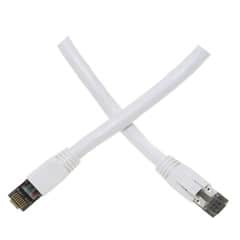 This 6-inch Category 8.1 cable, Class I channel, features a white PVC jacket, braided outer shield, with four individually mylar foil shielded 24 AWG pure copper pairs as defined in ISO/IEC 11801 and ratified in ANSI/TIA 568-C.2-1. Cat8 cabling was designed primarily for high-speed data centers where switches, servers, and other network hardware are located in close proximity. This newest copper communications cable offers greater flexibility both literally and in distances when compared to QSFP+ and Twinax DAC assemblies which typically cost significantly more and are often much more limited in scope. It has the reach to cover Top-of-Rack and End-of-Row or Middle-of-Row network topologies while delivering 10, 25, and 40 Gigabit data rates over BASE-T technology with RJ45 ends making it a drop-in replacement for Cat6a where rates beyond 10Gb will be needed today or in the future. Cat8 has stricter specifications for noise restriction and crosstalk than any of its predecessors. The individual conductors are 24 AWG (American wire gauge) stranded pure copper. Cat8 patch cables are stranded to improve flexibility. Pure copper conductors provide the best signal possible. Each pair of conductors is shielded with an aluminum mylar foil to reduce, if not eliminate, crosstalk. These cables also have a braided shield, which protects from outside electromagnetic interference.Part No. 13X8-59100.5
This 6-inch Category 8.1 cable, Class I channel, features a white PVC jacket, braided outer shield, with four individually mylar foil shielded 24 AWG pure copper pairs as defined in ISO/IEC 11801 and ratified in ANSI/TIA 568-C.2-1. Cat8 cabling was designed primarily for high-speed data centers where switches, servers, and other network hardware are located in close proximity. This newest copper communications cable offers greater flexibility both literally and in distances when compared to QSFP+ and Twinax DAC assemblies which typically cost significantly more and are often much more limited in scope. It has the reach to cover Top-of-Rack and End-of-Row or Middle-of-Row network topologies while delivering 10, 25, and 40 Gigabit data rates over BASE-T technology with RJ45 ends making it a drop-in replacement for Cat6a where rates beyond 10Gb will be needed today or in the future. Cat8 has stricter specifications for noise restriction and crosstalk than any of its predecessors. The individual conductors are 24 AWG (American wire gauge) stranded pure copper. Cat8 patch cables are stranded to improve flexibility. Pure copper conductors provide the best signal possible. Each pair of conductors is shielded with an aluminum mylar foil to reduce, if not eliminate, crosstalk. These cables also have a braided shield, which protects from outside electromagnetic interference.Part No. 13X8-59100.5 -
 This 1-foot Category 8.1 cable, Class I channel, features a white PVC jacket, braided outer shield, with four individually mylar foil shielded 24 AWG pure copper pairs as defined in ISO/IEC 11801 and ratified in ANSI/TIA 568-C.2-1. Cat8 cabling was designed primarily for high-speed data centers where switches, servers, and other network hardware are located in close proximity. This newest copper communications cable offers greater flexibility both literally and in distances when compared to QSFP+ and Twinax DAC assemblies which typically cost significantly more and are often much more limited in scope. It has the reach to cover Top-of-Rack and End-of-Row or Middle-of-Row network topologies while delivering 10, 25, and 40 Gigabit data rates over BASE-T technology with RJ45 ends making it a drop-in replacement for Cat6a where rates beyond 10Gb will be needed today or in the future. Cat8 has stricter specifications for noise restriction and crosstalk than any of its predecessors. The individual conductors are 24 AWG (American wire gauge) stranded pure copper. Cat8 patch cables are stranded to improve flexibility. Pure copper conductors provide the best signal possible. Each pair of conductors is shielded with an aluminum mylar foil to reduce, if not eliminate, crosstalk. These cables also have a braided shield, which protects from outside electromagnetic interference.Part No. 13X8-59101
This 1-foot Category 8.1 cable, Class I channel, features a white PVC jacket, braided outer shield, with four individually mylar foil shielded 24 AWG pure copper pairs as defined in ISO/IEC 11801 and ratified in ANSI/TIA 568-C.2-1. Cat8 cabling was designed primarily for high-speed data centers where switches, servers, and other network hardware are located in close proximity. This newest copper communications cable offers greater flexibility both literally and in distances when compared to QSFP+ and Twinax DAC assemblies which typically cost significantly more and are often much more limited in scope. It has the reach to cover Top-of-Rack and End-of-Row or Middle-of-Row network topologies while delivering 10, 25, and 40 Gigabit data rates over BASE-T technology with RJ45 ends making it a drop-in replacement for Cat6a where rates beyond 10Gb will be needed today or in the future. Cat8 has stricter specifications for noise restriction and crosstalk than any of its predecessors. The individual conductors are 24 AWG (American wire gauge) stranded pure copper. Cat8 patch cables are stranded to improve flexibility. Pure copper conductors provide the best signal possible. Each pair of conductors is shielded with an aluminum mylar foil to reduce, if not eliminate, crosstalk. These cables also have a braided shield, which protects from outside electromagnetic interference.Part No. 13X8-59101 -
 This 2-foot Category 8.1 cable, Class I channel, features a white PVC jacket, braided outer shield, with four individually mylar foil shielded 24 AWG pure copper pairs as defined in ISO/IEC 11801 and ratified in ANSI/TIA 568-C.2-1. Cat8 cabling was designed primarily for high-speed data centers where switches, servers, and other network hardware are located in close proximity. This newest copper communications cable offers greater flexibility both literally and in distances when compared to QSFP+ and Twinax DAC assemblies which typically cost significantly more and are often much more limited in scope. It has the reach to cover Top-of-Rack and End-of-Row or Middle-of-Row network topologies while delivering 10, 25, and 40 Gigabit data rates over BASE-T technology with RJ45 ends making it a drop-in replacement for Cat6a where rates beyond 10Gb will be needed today or in the future. Cat8 has stricter specifications for noise restriction and crosstalk than any of its predecessors. The individual conductors are 24 AWG (American wire gauge) stranded pure copper. Cat8 patch cables are stranded to improve flexibility. Pure copper conductors provide the best signal possible. Each pair of conductors is shielded with an aluminum mylar foil to reduce, if not eliminate, crosstalk. These cables also have a braided shield, which protects from outside electromagnetic interference.Part No. 13X8-59102
This 2-foot Category 8.1 cable, Class I channel, features a white PVC jacket, braided outer shield, with four individually mylar foil shielded 24 AWG pure copper pairs as defined in ISO/IEC 11801 and ratified in ANSI/TIA 568-C.2-1. Cat8 cabling was designed primarily for high-speed data centers where switches, servers, and other network hardware are located in close proximity. This newest copper communications cable offers greater flexibility both literally and in distances when compared to QSFP+ and Twinax DAC assemblies which typically cost significantly more and are often much more limited in scope. It has the reach to cover Top-of-Rack and End-of-Row or Middle-of-Row network topologies while delivering 10, 25, and 40 Gigabit data rates over BASE-T technology with RJ45 ends making it a drop-in replacement for Cat6a where rates beyond 10Gb will be needed today or in the future. Cat8 has stricter specifications for noise restriction and crosstalk than any of its predecessors. The individual conductors are 24 AWG (American wire gauge) stranded pure copper. Cat8 patch cables are stranded to improve flexibility. Pure copper conductors provide the best signal possible. Each pair of conductors is shielded with an aluminum mylar foil to reduce, if not eliminate, crosstalk. These cables also have a braided shield, which protects from outside electromagnetic interference.Part No. 13X8-59102 -
 This 3-foot Category 8.1 cable, Class I channel, features a white PVC jacket, braided outer shield, with four individually mylar foil shielded 24 AWG pure copper pairs as defined in ISO/IEC 11801 and ratified in ANSI/TIA 568-C.2-1. Cat8 cabling was designed primarily for high-speed data centers where switches, servers, and other network hardware are located in close proximity. This newest copper communications cable offers greater flexibility both literally and in distances when compared to QSFP+ and Twinax DAC assemblies which typically cost significantly more and are often much more limited in scope. It has the reach to cover Top-of-Rack and End-of-Row or Middle-of-Row network topologies while delivering 10, 25, and 40 Gigabit data rates over BASE-T technology with RJ45 ends making it a drop-in replacement for Cat6a where rates beyond 10Gb will be needed today or in the future. Cat8 has stricter specifications for noise restriction and crosstalk than any of its predecessors. The individual conductors are 24 AWG (American wire gauge) stranded pure copper. Cat8 patch cables are stranded to improve flexibility. Pure copper conductors provide the best signal possible. Each pair of conductors is shielded with an aluminum mylar foil to reduce, if not eliminate, crosstalk. These cables also have a braided shield, which protects from outside electromagnetic interference.Part No. 13X8-59103
This 3-foot Category 8.1 cable, Class I channel, features a white PVC jacket, braided outer shield, with four individually mylar foil shielded 24 AWG pure copper pairs as defined in ISO/IEC 11801 and ratified in ANSI/TIA 568-C.2-1. Cat8 cabling was designed primarily for high-speed data centers where switches, servers, and other network hardware are located in close proximity. This newest copper communications cable offers greater flexibility both literally and in distances when compared to QSFP+ and Twinax DAC assemblies which typically cost significantly more and are often much more limited in scope. It has the reach to cover Top-of-Rack and End-of-Row or Middle-of-Row network topologies while delivering 10, 25, and 40 Gigabit data rates over BASE-T technology with RJ45 ends making it a drop-in replacement for Cat6a where rates beyond 10Gb will be needed today or in the future. Cat8 has stricter specifications for noise restriction and crosstalk than any of its predecessors. The individual conductors are 24 AWG (American wire gauge) stranded pure copper. Cat8 patch cables are stranded to improve flexibility. Pure copper conductors provide the best signal possible. Each pair of conductors is shielded with an aluminum mylar foil to reduce, if not eliminate, crosstalk. These cables also have a braided shield, which protects from outside electromagnetic interference.Part No. 13X8-59103 -
 This 5-foot Category 8.1 cable, Class I channel, features a white PVC jacket, braided outer shield, with four individually mylar foil shielded 24 AWG pure copper pairs as defined in ISO/IEC 11801 and ratified in ANSI/TIA 568-C.2-1. Cat8 cabling was designed primarily for high-speed data centers where switches, servers, and other network hardware are located in close proximity. This newest copper communications cable offers greater flexibility both literally and in distances when compared to QSFP+ and Twinax DAC assemblies which typically cost significantly more and are often much more limited in scope. It has the reach to cover Top-of-Rack and End-of-Row or Middle-of-Row network topologies while delivering 10, 25, and 40 Gigabit data rates over BASE-T technology with RJ45 ends making it a drop-in replacement for Cat6a where rates beyond 10Gb will be needed today or in the future. Cat8 has stricter specifications for noise restriction and crosstalk than any of its predecessors. The individual conductors are 24 AWG (American wire gauge) stranded pure copper. Cat8 patch cables are stranded to improve flexibility. Pure copper conductors provide the best signal possible. Each pair of conductors is shielded with an aluminum mylar foil to reduce, if not eliminate, crosstalk. These cables also have a braided shield, which protects from outside electromagnetic interference.Part No. 13X8-59105
This 5-foot Category 8.1 cable, Class I channel, features a white PVC jacket, braided outer shield, with four individually mylar foil shielded 24 AWG pure copper pairs as defined in ISO/IEC 11801 and ratified in ANSI/TIA 568-C.2-1. Cat8 cabling was designed primarily for high-speed data centers where switches, servers, and other network hardware are located in close proximity. This newest copper communications cable offers greater flexibility both literally and in distances when compared to QSFP+ and Twinax DAC assemblies which typically cost significantly more and are often much more limited in scope. It has the reach to cover Top-of-Rack and End-of-Row or Middle-of-Row network topologies while delivering 10, 25, and 40 Gigabit data rates over BASE-T technology with RJ45 ends making it a drop-in replacement for Cat6a where rates beyond 10Gb will be needed today or in the future. Cat8 has stricter specifications for noise restriction and crosstalk than any of its predecessors. The individual conductors are 24 AWG (American wire gauge) stranded pure copper. Cat8 patch cables are stranded to improve flexibility. Pure copper conductors provide the best signal possible. Each pair of conductors is shielded with an aluminum mylar foil to reduce, if not eliminate, crosstalk. These cables also have a braided shield, which protects from outside electromagnetic interference.Part No. 13X8-59105 -
 This 7-foot Category 8.1 cable, Class I channel, features a white PVC jacket, braided outer shield, with four individually mylar foil shielded 24 AWG pure copper pairs as defined in ISO/IEC 11801 and ratified in ANSI/TIA 568-C.2-1. Cat8 cabling was designed primarily for high-speed data centers where switches, servers, and other network hardware are located in close proximity. This newest copper communications cable offers greater flexibility both literally and in distances when compared to QSFP+ and Twinax DAC assemblies which typically cost significantly more and are often much more limited in scope. It has the reach to cover Top-of-Rack and End-of-Row or Middle-of-Row network topologies while delivering 10, 25, and 40 Gigabit data rates over BASE-T technology with RJ45 ends making it a drop-in replacement for Cat6a where rates beyond 10Gb will be needed today or in the future. Cat8 has stricter specifications for noise restriction and crosstalk than any of its predecessors. The individual conductors are 24 AWG (American wire gauge) stranded pure copper. Cat8 patch cables are stranded to improve flexibility. Pure copper conductors provide the best signal possible. Each pair of conductors is shielded with an aluminum mylar foil to reduce, if not eliminate, crosstalk. These cables also have a braided shield, which protects from outside electromagnetic interference.Part No. 13X8-59107
This 7-foot Category 8.1 cable, Class I channel, features a white PVC jacket, braided outer shield, with four individually mylar foil shielded 24 AWG pure copper pairs as defined in ISO/IEC 11801 and ratified in ANSI/TIA 568-C.2-1. Cat8 cabling was designed primarily for high-speed data centers where switches, servers, and other network hardware are located in close proximity. This newest copper communications cable offers greater flexibility both literally and in distances when compared to QSFP+ and Twinax DAC assemblies which typically cost significantly more and are often much more limited in scope. It has the reach to cover Top-of-Rack and End-of-Row or Middle-of-Row network topologies while delivering 10, 25, and 40 Gigabit data rates over BASE-T technology with RJ45 ends making it a drop-in replacement for Cat6a where rates beyond 10Gb will be needed today or in the future. Cat8 has stricter specifications for noise restriction and crosstalk than any of its predecessors. The individual conductors are 24 AWG (American wire gauge) stranded pure copper. Cat8 patch cables are stranded to improve flexibility. Pure copper conductors provide the best signal possible. Each pair of conductors is shielded with an aluminum mylar foil to reduce, if not eliminate, crosstalk. These cables also have a braided shield, which protects from outside electromagnetic interference.Part No. 13X8-59107 -
 This 15-foot Category 8.1 cable, Class I channel, features a white PVC jacket, braided outer shield, with four individually mylar foil shielded 24 AWG pure copper pairs as defined in ISO/IEC 11801 and ratified in ANSI/TIA 568-C.2-1. Cat8 cabling was designed primarily for high-speed data centers where switches, servers, and other network hardware are located in close proximity. This newest copper communications cable offers greater flexibility both literally and in distances when compared to QSFP+ and Twinax DAC assemblies which typically cost significantly more and are often much more limited in scope. It has the reach to cover Top-of-Rack and End-of-Row or Middle-of-Row network topologies while delivering 10, 25, and 40 Gigabit data rates over BASE-T technology with RJ45 ends making it a drop-in replacement for Cat6a where rates beyond 10Gb will be needed today or in the future. Cat8 has stricter specifications for noise restriction and crosstalk than any of its predecessors. The individual conductors are 24 AWG (American wire gauge) stranded pure copper. Cat8 patch cables are stranded to improve flexibility. Pure copper conductors provide the best signal possible. Each pair of conductors is shielded with an aluminum mylar foil to reduce, if not eliminate, crosstalk. These cables also have a braided shield, which protects from outside electromagnetic interference.Part No. 13X8-59115
This 15-foot Category 8.1 cable, Class I channel, features a white PVC jacket, braided outer shield, with four individually mylar foil shielded 24 AWG pure copper pairs as defined in ISO/IEC 11801 and ratified in ANSI/TIA 568-C.2-1. Cat8 cabling was designed primarily for high-speed data centers where switches, servers, and other network hardware are located in close proximity. This newest copper communications cable offers greater flexibility both literally and in distances when compared to QSFP+ and Twinax DAC assemblies which typically cost significantly more and are often much more limited in scope. It has the reach to cover Top-of-Rack and End-of-Row or Middle-of-Row network topologies while delivering 10, 25, and 40 Gigabit data rates over BASE-T technology with RJ45 ends making it a drop-in replacement for Cat6a where rates beyond 10Gb will be needed today or in the future. Cat8 has stricter specifications for noise restriction and crosstalk than any of its predecessors. The individual conductors are 24 AWG (American wire gauge) stranded pure copper. Cat8 patch cables are stranded to improve flexibility. Pure copper conductors provide the best signal possible. Each pair of conductors is shielded with an aluminum mylar foil to reduce, if not eliminate, crosstalk. These cables also have a braided shield, which protects from outside electromagnetic interference.Part No. 13X8-59115 -
 This cable is constructed of two Cat6 cables (Blue and Grey) and two RG6 cables (Black and White) bundled inside of an outer jacket (CM Rated) and a maximum operating temperature of 75C. Each Cat6 cable is constructed with 4 solid copper 23AWG twisted pairs and a center spline. Jacket is CM Rated. Each RG6 coaxial cable is quad shielded 3.0 GHz: outer aluminum braid (40% coverage), outer double foil of aluminum, inner aluminum braid (60% coverage) and one more aluminum foil layer. The center conductor is CCS (copper clad steel)Part No. 14X4-161NF
This cable is constructed of two Cat6 cables (Blue and Grey) and two RG6 cables (Black and White) bundled inside of an outer jacket (CM Rated) and a maximum operating temperature of 75C. Each Cat6 cable is constructed with 4 solid copper 23AWG twisted pairs and a center spline. Jacket is CM Rated. Each RG6 coaxial cable is quad shielded 3.0 GHz: outer aluminum braid (40% coverage), outer double foil of aluminum, inner aluminum braid (60% coverage) and one more aluminum foil layer. The center conductor is CCS (copper clad steel)Part No. 14X4-161NF -
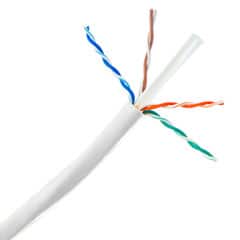 Our white plenum solid Cat6a Ethernet cable is used for networking and phone infrastructure and comes in a convenient spool. Cat6a Cable is used in network applications and has been designed specifically for 10 Gigabit Ethernet applications. This particular cable is a plenum rated white UTP (Unshielded Twisted Pair) bulk cable. The individual conductors are 23 AWG (American wire gauge) solid pure copper. Our Cat6a Ethernet cable exceeds the EIA/TIA-568-C standard. In a typical residential environment, an in-wall rated cable will suffice. However, commercial installations of cabling will have more requirements. In commercial buildings, there will be an area between floors or above office areas for heating/cooling airflow called the Plenum. If an office were to catch fire, this plenum area could easily allow the spread of the fire to more floors or across the entire building. Cables that do not have a jacket rated for in wall or plenum use could actually cause the fire to become more intense. Plenum rated cables are jacketed with a fire-retardant plastic jacket of either a low-smoke polyvinyl chloride (PVC) or a fluorinated ethylene polymer (FEP) for less toxicity during a fire. If a fire gets into a plenum rated area that contains plenum rated cables and the fire spreads, the cables will not be to blame.Part No. 14X6-091NH
Our white plenum solid Cat6a Ethernet cable is used for networking and phone infrastructure and comes in a convenient spool. Cat6a Cable is used in network applications and has been designed specifically for 10 Gigabit Ethernet applications. This particular cable is a plenum rated white UTP (Unshielded Twisted Pair) bulk cable. The individual conductors are 23 AWG (American wire gauge) solid pure copper. Our Cat6a Ethernet cable exceeds the EIA/TIA-568-C standard. In a typical residential environment, an in-wall rated cable will suffice. However, commercial installations of cabling will have more requirements. In commercial buildings, there will be an area between floors or above office areas for heating/cooling airflow called the Plenum. If an office were to catch fire, this plenum area could easily allow the spread of the fire to more floors or across the entire building. Cables that do not have a jacket rated for in wall or plenum use could actually cause the fire to become more intense. Plenum rated cables are jacketed with a fire-retardant plastic jacket of either a low-smoke polyvinyl chloride (PVC) or a fluorinated ethylene polymer (FEP) for less toxicity during a fire. If a fire gets into a plenum rated area that contains plenum rated cables and the fire spreads, the cables will not be to blame.Part No. 14X6-091NH -
 Our white plenum shielded solid Cat6a Ethernet cable is used for networking and phone infrastructure and comes in a convenient spool. Cat6a Cable is used in network applications and has been designed specifically for 10 Gigabit Ethernet applications. This particular cable is a plenum rated white shielded bulk cable. The individual conductors are 23 AWG (American wire gauge) solid pure copper. Our Cat6a Ethernet cable exceeds the EIA/TIA-568-C standard. In a typical residential environment, an in-wall rated cable will suffice. However, commercial installations of cabling will have more requirements. In commercial buildings, there will be an area between floors or above office areas for heating/cooling airflow called the Plenum. If an office were to catch fire, this plenum area could easily allow the spread of the fire to more floors or across the entire building. Cables that do not have a jacket rated for in wall or plenum use could actually cause the fire to become more intense. Plenum rated cables are jacketed with a fire-retardant plastic jacket of either a low-smoke polyvinyl chloride (PVC) or a fluorinated ethylene polymer (FEP) for less toxicity during a fire. If a fire gets into a plenum rated area that contains plenum rated cables and the fire spreads, the cables will not be to blame.Part No. 14X6-591NH
Our white plenum shielded solid Cat6a Ethernet cable is used for networking and phone infrastructure and comes in a convenient spool. Cat6a Cable is used in network applications and has been designed specifically for 10 Gigabit Ethernet applications. This particular cable is a plenum rated white shielded bulk cable. The individual conductors are 23 AWG (American wire gauge) solid pure copper. Our Cat6a Ethernet cable exceeds the EIA/TIA-568-C standard. In a typical residential environment, an in-wall rated cable will suffice. However, commercial installations of cabling will have more requirements. In commercial buildings, there will be an area between floors or above office areas for heating/cooling airflow called the Plenum. If an office were to catch fire, this plenum area could easily allow the spread of the fire to more floors or across the entire building. Cables that do not have a jacket rated for in wall or plenum use could actually cause the fire to become more intense. Plenum rated cables are jacketed with a fire-retardant plastic jacket of either a low-smoke polyvinyl chloride (PVC) or a fluorinated ethylene polymer (FEP) for less toxicity during a fire. If a fire gets into a plenum rated area that contains plenum rated cables and the fire spreads, the cables will not be to blame.Part No. 14X6-591NH


